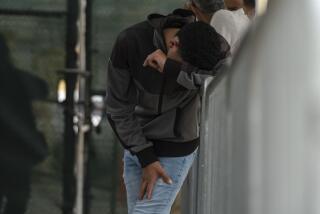New unit gets its boots on the ground in Iraq
- Share via
BAGHDAD — Soldiers from the 1st Battalion, 28th Infantry Regiment were rolling out in a convoy of Humvees to check out their new digs at an abandoned school when they found out it wasn’t so abandoned anymore: It was filled with children and teachers.
“Someone decided they really don’t want us to go there, so they decided to put school back in session,” they were informed over the military radio.
Mixed receptions may prove a recurring theme as U.S. military leaders add more than 21,000 troops in Iraq, and move others from the massive and sometimes remote bases where they have been stationed into community posts close to the action.
The soldiers of the 1-28 are being placed in a simmering corner of Baghdad’s Rashid district, in a band that runs south of the city’s treacherous airport road.
The only security previously in the area was about 120 soldiers who patrolled out of a large base a few miles to the south. Now more than 700 soldiers will be living in and guarding the neighborhood.
The 1-28 was ordered to the region just a year after it was formed, less than half the time that a new unit usually has to get up and running. Many of its junior soldiers are straight out of basic training and have yet to even receive the uniform patches that signify they’ve been deployed.
The northern section of the area they will patrol was once Sunni Muslim, with large, ornate mansions that were home to members of Saddam Hussein’s government. Just to the south was a mixed sector of Shiite and Sunni residents, and farther south was another section, virtually all Shiite.
Now, after more than a year of Sunni-Shiite violence, the area has polarized along sectarian lines. Shiites have pushed north, taking over the mixed area, and whole blocks have been abandoned as Sunnis have moved away.
“These people just want a stable life,” said Lt. Col. Pat Frank, the battalion commander.
An alternate address
Military officials had been meeting with community leaders and local police to pave the way for a smooth entrance in the neighborhoods. And though the school was off the table, the battalion had a second outpost it planned to occupy, in a spacious former athletic club with a worn weight room and fading posters of Arnold Schwarzenegger. Members stopped coming about four months ago because it became too dangerous.
One day last week, the proprietor, Jawad Kadan Naser, and his four sons welcomed the troops with a breakfast of flatbread, cheese, jam and chai tea while chickens ran about in the yard.
“I feel very comfortable, because it’s more safe, for me and for the neighbors,” Naser said through an interpreter. “I told my community they can feel good; if they’ve been hiding out now they can come back to the neighborhood.”
Still, not all are looking forward to the Americans’ presence. In the hours before they left to examine the athletic club, soldiers had discovered two roadside bombs in the area, and a sniper had fired on a patrol. During the day, another roadside bomb would be discovered nearby, and another patrol would be fired on the following day.
Some kinks are still being worked out: During the tour of the athletic club, the lead Humvee in the security detail had to be told repeatedly to slow down -- no small matter, because lower speeds help minimize the impact of some roadside bombs.
For now, many in the neighborhood seem ready to give the soldiers a chance. On a patrol last week, children ran out to the convoy of passing Humvees, waving and giving thumbs-up signs; a gunner in one threw candy to them from his turret. Soldiers got out of their vehicles and walked for several blocks through a neighborhood called Aamel, receiving polite -- if wary -- greetings from adults.
And the soldiers are eager to prove themselves up to the task. When a report came over the radio of shots fired at a patrol in a nearby neighborhood, Lt. Mike Scheer, a 23-year-old from Walnut Creek, Calif., readied his Alpha Company platoon to ride to the rescue, only to be called off after the snipers melted away.
“It’s a hot spot right now, but I think we can do a lot of good,” he said later. “I want the guys who want to fight to find us, and give the people there a little peace.”
Despite their relative inexperience, more veteran soldiers said they thought the soldiers of the 1-28 were ready.
“They learn fast,” said Skyler Preszler, a 23-year-old staff sergeant with the team that is handing off control of the area. “They adapt really quickly. I think they’ll do fine.”
More to Read
Sign up for Essential California
The most important California stories and recommendations in your inbox every morning.
You may occasionally receive promotional content from the Los Angeles Times.








